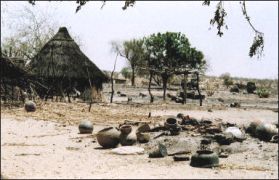Desert sands slowly engulf Darfur village abandoned after Janjaweed plunder
TUNDUBAI, Sudan, Aug 6 (AFP) — The desert sands are slowly covering what remains of the houses in this abandoned village, identical to hundreds of others plundered by Janjaweed militias which, backed by the government, are inflicting a reign of terror on non-Arab minorities in Sudan’s Darfur region.
 Only the ochre walls, many blackened by fire, remain, the thatched roofs having gone up in blazes set by the marauding militia.
Only the ochre walls, many blackened by fire, remain, the thatched roofs having gone up in blazes set by the marauding militia.
The village, 35 kilometres (20 miles) from the border with Chad, used to be home to about 2,000 people.
Those who were not killed or abducted in the militia attack in January have likely taken refuge in camps in this western region of Sudan or over the border in Chad, where up to 200,000 Sudanese have fled.
The Janjaweed are the Arab nomads of the region, who arrive suddenly on the backs of horses or camels with their swords and rifles. They murder, maim, rape and pillage, according to aid and rights workers here.
Then they melt back into their natural habitat, the desert stretching hundreds of miles across the frontier with Chad.
They are accused by international human rights monitors of systematic atrocities against Darfur’s people of non-Arab, black African origin.
The United Nations describes the humanitarian crisis in Darfur as currently the world’s worst, with up to 50,000 people dead and more than a million driven from their villages.
Crockery, a teapot, a pair of sandals a wicker basket, a child’s toy, a smashed oil lamp, were among the objects lying in the narrow, deserted streets of Tundubai, the sand slowly covering them up.
Inside the burnt-out houses blackened cooking utensils and jars of food could be distinguished amid the piles of ash left by the incinerated thatched roofs.
Here lies a metal beam and chairs twisted by the flames. There a metal trunk, also turned black by the fire, its padlocks still intact.
In most of the houses the large black earthenware jars used to store water or millet lie shattered.
A morbid silence envelopes the town. There is no one around to tell what happened.
But villagers who have fled their homes across Darfur all have similar stories to tell.
The Janjaweed first encircle the village, they say, then round up the villagers before separating the men from the women.
Adult males are often executed, the women raped, those deemed the prettiest taken off to serve as sex slaves and servants for the nomadic militia.
The Janjaweed then loot the village, taking foodstuffs and livestock, before torching houses and forcing the villagers to flee.
Here in Tundubai, the wooden doors ripped from their hinges testify to the violence of the attack. The cattle enclosures have been torn down, their former occupants long gone.
Only the bigger houses, those that were made entirely of clay, have managed to survive the fires intact. Today they stand empty in the desert breeze.
